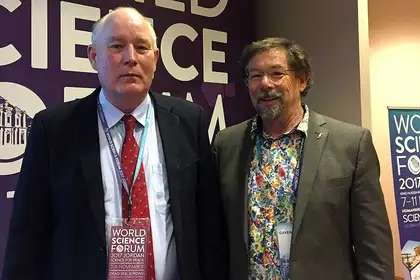
Professors Moughan and Martin.
Two Massey University distinguished professors represented the University at the World Science Forum, held in Jordan late last month.
Distinguished Professor Paul Moughan and Distinguished Professor Gaven Martin, both from the University’s College of Sciences, joined other leaders in their field from around the world to discuss the social and economic relevance, influence and responsibilities of science.
Professor Moughan spoke about his work with the International Academy Partnership around food and nutrition security, noting the world’s rapidly growing population will result in the need to produce 70 per cent more food by 2050.
The growth, he said, would be in developing nations due to their burgeoning middle classes and subsequent increase in demand for high protein foods such as eggs, fish, meat and dairy. While close to 800 million humans currently suffer from malnutrition, Professor Moughan said it appears there is sufficient cultivable land to meet the increased demand but agricultural productivity will need to increase and food wastage decline, with the ability to use all food nutrients, especially proteins, will become critical.
Professor Martin was involved due to his work with the International Council of Science, a major sponsor of the World Science Forum. Professor Martin took part in a two-day meeting of the Committee for Freedom and Responsibility in the conduct of Science, discussing the recent merger of the International Council of Science with the International Social Sciences Council and the treatment of scientists in Iran and Turkey.
The forum was opened by Jordan’s Prince El Hassan bin Talal, who also presented the plenary session on the topic of ‘science for peace’. Other speakers included the Prince’s daughter, Princess Sumaya bint El Hassan, President of Hungary János Áder and South Africa’s Minister for Science and Technology Grace Naeldi Pandor.